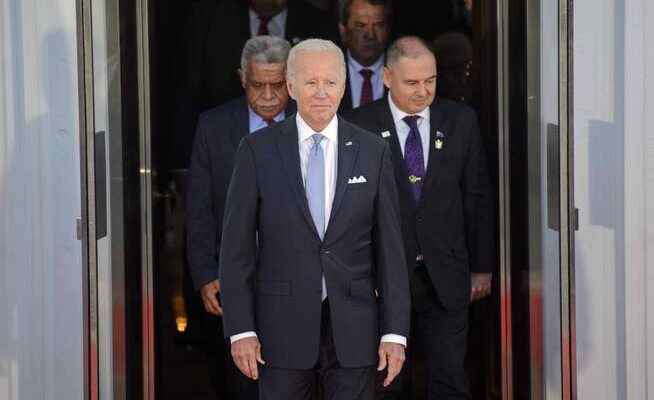At a summit with fourteen Pacific countries, the Biden government pledged its long-term commitment. However, implementation will not be easy.
President Joe Biden enters the White House garden with the representatives of the 14 Pacific island states.
“The security of America – and quite frankly the whole world – depends on the security of the Pacific Islands.” With this sentence President Joe Biden described the importance of the small nations in the Pacific on Thursday evening local time. Biden had invited fourteen of them to a joint summit in Washington.
China’s action in the Solomon Islands was a wake-up call
There is a simple reason why the President of the United States takes time for the representatives of these small states, which have a total of just 10 million inhabitants: China. When Beijing signed a security agreement with the Solomon Islands in April, Washington suddenly realized that a region it had for decades considered its maritime backyard was being courted by a hostile power.
Until now, the countries in the Pacific have always complained that they are ignored by the rest of the world. Now the growing interest of the great powers in the region is bringing a new danger: the small states fear being crushed in the geopolitical tussle between the USA and China. Even if they now become one joint statement with Washington known, hardly anyone can afford to break with China. The economic ties with Beijing are simply too great.
China is therefore not mentioned in the declaration of the fourteen countries with the USA – which Washington would certainly have liked to have had. Because in the also published on Thursday American strategy paper on the Pacific It says: “The People’s Republic of China is exerting increasing pressure and economic coercion, thus undermining the peace, prosperity and security of the region – and by extension also the United States.” But even here, Washington seems to be considerate of the sensitivities of the Pacific countries: China is only mentioned once in sixteen pages.
For the Pacific Islands, however, the greatest danger does not come from China, but from climate change. Many are acutely affected by the effects of hurricanes, droughts or rising sea levels. The topic is correspondingly present in the joint declaration with the USA. The island countries brought their points into the document and negotiated hard and well, says Anna Powles, a researcher on Pacific geopolitics at Massey University in New Zealand.
The US has pushed hard for consensus
The fact that the Biden government managed to get the fourteen countries to sign a joint declaration is a diplomatic success. At the beginning of the week it was said that the Solomon Islands would not sign the declaration. It seemed that China’s influence in Honiara was already so great that it could prevent a common position among the Pacific countries that did not correspond to its ideas.
That would have boded badly not only for the summit with the US, but also for the regional organization Pacific Islands Forum (PIF). There, decisions are made by consensus. If the Solomon Islands were to become Beijing’s messenger, the PIF would face a similar problem to the Association of Southeast Asian Nations (ASEAN): Cambodia is so dependent on China that it blocks any Asean decisions critical of China.
In May, China itself tried to sign a security and trade agreement with ten Pacific countries. Foreign Minister Wang Yi personally lobbied for it in seven capitals. But the island nations wanted nothing to do with the advance. They felt run over by Beijing. “There were practically no negotiations at the time,” says Powles, “but the Americans spent weeks trying to find a common line with the summit participants.”
At the summit, the Biden government named a number of measures that it intends to use to expand its involvement in the region. Washington previously announced that it would open three new embassies in the Solomon Islands, Tonga and Kiribati. Additionally, Biden will appoint a delegate to the PIF.
Washington also wants to recognize Niue and the Cook Islands as independent countries. These are PIF full members. However, the Americans have so far regarded them as associated with New Zealand and therefore not as independent territories.
In addition, the US Coast Guard is to help fight illegal fishing. Since fishing licenses are an important source of income for the Pacific States with their huge exclusive economic zones, illegal fishing causes great damage. These are often Chinese ships.
Implementation will depend on US domestic policy
According to American information, 810 million dollars are to be made available for the various projects. That includes $600 million for a ten-year maritime security program that had previously been proposed to Congress.
Biden said in his brief address that the goal of all measures is a free and open Indo-Pacific that is stable, prosperous, resilient and secure.
The big question is whether the American government can put its cheap words into practice. Congress still has to approve the corresponding budgets. And whether the next post-Biden administration will maintain the priorities is another question.
“The will is obviously there,” comments Powles, “but it will be a great challenge to meet all the obligations. American domestic politics will certainly have an impact.”
